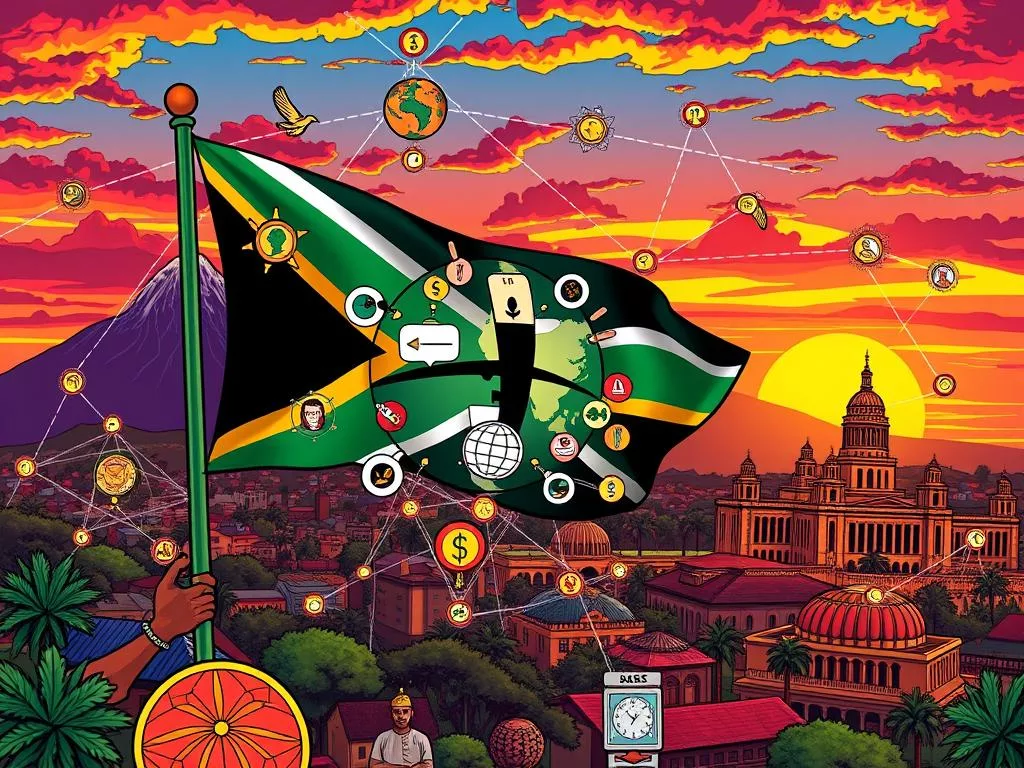Getting money from abroad in South Africa can be tricky. You need to know the rules, choose the right bank, and deal with high fees. This guide will help you understand how to send money internationally to South Africa. It covers fees, how long it takes, and what rules you must follow.
South Africa has strict rules on foreign money. You must tell the South African Reserve Bank about all foreign money deals. There’s no limit on how much money you can get from abroad. But, the fees for sending money vary a lot.
These fees are taken out before the money reaches you. Banks in between might also charge extra fees. This can make the money you get less than expected.
To make getting money from abroad easier, look into Wise and Currencies Direct. Wise has exchange rates that are very close to the real rate. This makes it a great choice for sending money across borders.
Also, Wise is good for sending small to medium amounts of money. This is common when sending money to family or friends overseas.
Overview of International Payments in South Africa
South Africa’s business world is all about global connections. This means understanding how to handle money across borders is key. For example, people in South Africa can send up to R1 million abroad each year without needing to get approval from the South African Revenue Service (SARS).
But, if you’re sending more than R1 million, things get a bit stricter. You’ll need to follow more rules and get approval from the right places.
For amounts between R1 million and R10 million, you’ll need an AIT PIN from SARS. You’ll have to provide documents like a Tax Compliance Status (TCS) PIN and a Tax Residency Confirmation Letter. Non-residents will need a Non-Resident Confirmation Letter from SARS and a Capital Gains Tax Calculation schedule.
This system makes sure big money moves follow the rules. It helps keep the economy stable.

South Africa also has rules for big money moves, thanks to the Financial Surveillance Department and the South African Reserve Bank. Digital wallets and mobile money are becoming popular for their quickness and lower costs. It’s important to think about the tax implications and currency exchange rates when making international payments.
For amounts over R11 million, you’ll need special approval. This includes a Letter of Compliance from SARS and the South African Reserve Bank (SARB). This shows South Africa’s effort to control big money moves and avoid economic risks.
Also, when getting money from abroad, it’s good to know about different payment methods. Look at fees, how fast the money moves, and new fintech options. For more on making international payments, check out these efficient payment methods for cross-border transactions.
Taxes are also important when dealing with international money moves. Tax residents must report all global income. Non-residents are only taxed on income from South Africa. You’ll also need to be open about financial connections, like trust benefits and shareholdings in legal entities.
As businesses grow globally, knowing these rules and strategies is vital. This knowledge helps with following the rules, being efficient, and saving money on international payments.
New tech like blockchain and cryptocurrency can make things easier and cheaper. For businesses looking to grow worldwide, using both old and new methods is a good idea.
The world of finance is always changing. By keeping up with South Africa’s payment rules and strategies, you can make sure your international money moves are smooth and profitable.
Guide to Receiving Money from Overseas in South Africa
When looking at the best banks for international transfers in South Africa, consider FNB, Nedbank, Standard Bank, and Bidvest. Each bank has its own benefits for getting money from abroad. FNB, for example, handles many currencies like USD, GBP, and EUR, as well as AUD, BWP, and CHF.

Nedbank is known for updating its exchange rates every 15 minutes. It supports major currencies and 20 more. This helps customers make smart choices when dealing with international payments. Standard Bank also offers a wide range of currencies, with 48 options available.
Bidvest is another good choice for international wire transfers in South Africa. It offers USD, EUR, GBP, and less common currencies like ARS and BRL. For businesses dealing with international money, it’s important to check which banks can handle different currencies well.
Receiving international wire transfers in South Africa usually uses SWIFT payments. These payments usually arrive in a few days. To speed things up, IBAN, wire transfers, and credit cards can be used. But, the fees for these transfers can vary a lot.
Receiving banks in South Africa might charge extra fees for international wire transfers. These fees can range from $10 to $20. Transfers usually take 1-3 business days, but can take longer with intermediary banks.
US banks charge between $30 to $50 for international wire transfers. It’s wise to compare these fees with money transfer providers. Providers like Wise or PayPal can be cheaper and faster.
Using FinTech solutions like Wise or PayPal can make international transfers cheaper and faster. They can cut down costs and speed up the transfer of money. For more information, check out this guide receiving international payments.
Avoiding High Fees: Why Wise and Currencies Direct are Essential
Traditional banks in South Africa often charge high fees for international money transfers. They also offer bad exchange rates. Even Capitec Bank, while helpful, has fees like a R50 charge for incoming payments and R175 for outgoing ones. These costs add up with intermediary bank charges, making it pricey.
For those wanting to save on fees, Wise transfers South Africa and Currencies Direct are great choices.
Wise has a clear fee of just 0.48% of the transfer amount. They use the mid-market exchange rate, which is better than what banks offer. Unlike banks, Wise makes it easy to track your money and shows all charges clearly. This is great for the 2.8 million immigrants in South Africa who need to send money abroad.
Currencies Direct also offers lower fees and services that fit your needs. They are good for both personal and business money transfers. This means you can save money and manage your finances better.
Compared to Capitec Bank’s rules, Currencies Direct is a better choice. They don’t have limits on how much you can send out. By using these services, you can avoid the high costs and long waits of traditional bank transfers. You’ll also get the flexibility and lower costs that make global money transfers easier.

